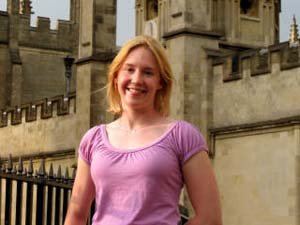Catching up with our Gopher Rhodes Scholar

In high school, Ashley Nord set the South Dakota state record in pole vault and graduated as valedictorian of her Stevens High School class. At the University of Minnesota, she competed in pole vault, and had three majors in the classroom. Nord didn’t stop there, though. In 2008, she was named one of 32 Rhodes Scholars, and she is now working on a doctorate degree in Oxford, England.
Nord went into the Rhodes application process with an impressive résumé. Her academic experiences included majors in Astrophysics, Global Studies, and Physics; a summer studying in Venezuela; and participation in astrophysics and biophysics research with the University of Hawai’i and UCLA, respectively. Even with this strong background, Nord was still surprised when she learned that she had won a Rhodes scholarship.
“To be honest, I didn't think I would receive the scholarship,” she said. “I remember being stunned by the other applicants and their accomplishments. After the interview, I was very content with the experience, because I felt that it had prepared me for future similar situations, and I was prepared to leave with that as my only prize…When I accepted the scholarship, I felt incredibly honored, and that feeling has not diminished.”
She spent a week in Washington, D.C., getting to know other Rhodes scholars before setting off for England in the fall of 2009. When she arrived in Oxford in October, she was “awestruck and nervous.” The cultural differences between England and the United States took some getting used to, but her previous international experiences have helped her adjust.
“I think that situations that shove you outside your comfort zone help you to understand both yourself and others,” Nord said. “My times in Venezuela helped me to understand that being able to make cross-cultural comparisons and actually understanding the foreign culture are two very distinct things. I think this has helped me to step back and absorb the culture of Britain and Oxford with less hesitation.”
There are many structural and social differences between Oxford and typical American universities. For one thing, the 32 colleges at Oxford are not divided by area of study. And a student’s entire degree at Oxford is based on a single comprehensive test at the end of her years of study. Culturally, Oxford is generally more formal than American schools. Most students are required to wear black gowns to dinner.
Nord, now 25 and more accustomed to English culture, is working on her D.Phil (Oxford and Cambridge’s equivalent of a Ph.D) in Condensed Matter Physics—specifically in Biophysics—which will take about four years to earn. She has done some coursework, but her main focus is research. Nord is currently studying the physics of the bacterial flagellar motor—the motor on a bacterial cell that allows the cell to move.
“Once this is understood, this motor may be able to be used for nanoscale medical operations,” she said. “It seems a bit like science fiction at the moment, but imagine sticking a cancer drug to one of these motors, and sending the motor into the body to find the tumor and deliver the medicine.”
Even though she is doing this advanced research, Nord still finds time to continue her athletic pursuits. At the U of M, she cleared 13 feet in pole vault. She competed in the NCAA Midwest Region Championships in the 2007 and 2008 seasons.
At Oxford, Nord is competing in pole vault as well as training “less seriously” for some other events. She competed in this year’s meet against Cambridge—an event in which the likes of Harold Abrahams and Roger Bannister have participated. She even ran on the track where Bannister recorded the first sub-4 minute mile.
At Oxford, sports are run differently than NCAA sports. The differences start with the name—track and field is called “athletics” in England. Less superficially, the structure of sports is different, too. “All the sport teams here are entirely student-run, which is incredibly cool,” Nord said. “It means that the athletes are never performing to please a coach or maintain a scholarship; they're out there simply because they love it. Since all of the responsibilities, including most of the coaching, fall upon the students, it creates a very intense bond among the team, which I love.”
In addition to competing, Nord is also helping coach other pole vaulters. The Oxford University Athletics Club isn’t as highly funded as the University of Minnesota program, but Nord says that the challenges that come with lower funding—along with a bigger reliance on herself and her teammates—have helped her to improve as both an athlete and a coach.
Another thing that has helped her is her family’s history of higher education. Nord’s older brothers, Michael and Jason, have a Ph.D. and a Masters, respectively.
“I absolutely would not be here if it wasn't for the encouragement of my older brothers and my parents,” she said. “It's always easier to do something someone else before you has done, and they're quite an inspiration. I am where I am because so many people chose to provide me with opportunities, and I'm incredibly grateful.”
Even now that she is across the Atlantic Ocean, doing groundbreaking research, competing in the same places as legends, and finding time to explore Europe, Nord still saves a place in her heart for memories from the U of M. She feels like her academics at the U prepared her well for Oxford. On the track side, she names Minnesota’s first Big Ten title as one of her favorite memories, and says that advice she has gotten from her former coaches has been useful.
“Track and the U of M taught me a great deal about teamwork and how to be an effective member of a team, which has been incredibly valuable here,” she said. Best of luck to Ashley Nord as she continues her studies and athletics.
Reprinted with permission from gophersports.com.
